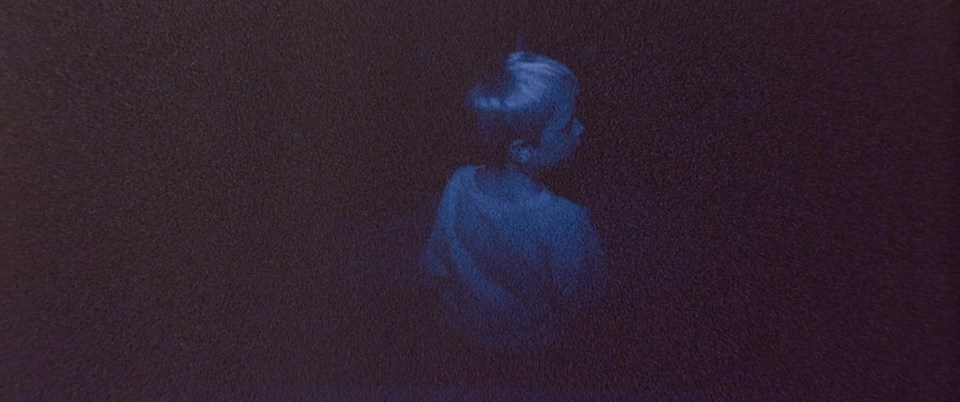EDMONTON — The immersive, slow-burn experience viewers get from "Skinamarink" is the antithesis of seconds-long videos seen on TikTok, a platform that helped create buzz for the low-budget Canadian horror film months before its release.
The Edmonton-shot movie is about two children who wake to find their parents and all the windows and doors to the outside world have vanished. With long still shots of corners in a suburban home, it has the non-linear sensation of a dream. Viewers never see the characters' faces and rarely hear them speak.
While some have said on social media they nearly walked out of the theatre because of the movie's crawling pace, associate producer Jonn Kmech says it allows audiences to absorb the film and invest in what’s to come.
Theatres across North America sold out for the premiere of the movie directed and written by Edmonton filmmaker Kyle Edward Ball.
Although filmed digitally, the movie is dark and grainy, an effect added in post-production, giving it a quality akin to a VHS tape playing on an old television.
“They wanted to go for a kind of vintage 1970s celluloid film look,” says executive producer Edmon Rotea.
While most shots are stills, the grain is constantly buzzing across the display as viewers probe the screen for lurking shadows.
"It’s such a personal film because it’s so much based on your own experience and what you see in the grain and how you react to the sounds," says Kmech.
Ball honed his filmmaking skills creating no-budget shorts on YouTube, rendering nightmares suggested to him by viewers on his "Bite Sized Nightmares" channel. He kept hearing of people dreaming they were trapped in their homes, alone or with a sibling, while sensing an ominous spirit prowling around every corner. That common nightmare eventually inspired the premise of Ball’s first feature-length film.
Kmech says Ball set some rules for himself when he started making "Skinamarink."
“Despite the very dreamlike quality of it, and how non-linear some of the parts are, the film was very tightly plotted and conceived by him.”
"Skinamarink" was filmed over seven days in August 2021 with a budget of $15,000. The film has grossed more than $1.5 million since its premiere Jan. 13.
Rotea says Ball edited the film on his gaming laptop and financed it mainly through crowdfunding.
"You don’t have to have state-of-the-art equipment," says Rotea. "You don’t have to have the greatest actors, or the most talented cast and crew. You can do stuff on a budget."
Rotea, an aspiring filmmaker himself, says he knew Ball for several years before joining the project. They met at a camera store in downtown Edmonton where Ball worked.
Ball became fatigued with that job during the COVID-19 pandemic and took a leave of absence to work on his film, says Rotea.
“It was never intended for theatrical or even broadcast or streaming. It was meant as kind of a way of coping with COVID and to prove to friends and family that he could write and direct this film,” says Rotea.
"Skinamarink" was shown at film festivals across North America and Europe last summer. One of the European festivals had online screenings and was hacked. "Skinamarink" was leaked online and became heavily pirated.
But what was thought to be a catastrophe for the film’s success created buzz on TikTok and among movie influencers.
"It was unfortunate that it leaked, but at the same time, it drove momentum online," says Kmech.
This put pressure to move the premiere of "Skinamarink" forward. Its initial premiere was planned for Halloween 2023.
It was not easy for "Skinamarink" to get picked up. Producers approached Canadian production companies with no luck and had almost lost hope until their last attempt with AMC came through.
Now, Ball has Hollywood production companies like Universal and A24 expressing interest in his next project.
“Hopefully Kyle’s next film will be backed by Hollywood and we’ll have a bigger budget,” says Rotea.
People on social media have been comparing "Skinamarink" to popular "found-footage" horror films "The Blair Witch Project" (1999) and "Paranormal Activity" (2007). But Rotea and Kmech agree the only comparison they see is that they were low-budget, independent horror movies that became extremely successful.
"The Last of Us," an HBO “fungal horror” series that premiered the same weekend as "Skinamarink," was also filmed in Edmonton, among other Alberta locations. It had a budget of more than $10 million.
“We're definitely proud that the 'Last of Us' and 'Skinamarink' are getting a lot of exposure in the world,” says Rotea. “We hope that it will spur more independent filmmaking and more filmmaking among horror projects, which don't receive as much funding.”
Rotea says "Skinamarink" resonates with a lot of people because it reminds them of issues in their own lives — "feelings of loneliness, isolation, abandonment, parental separation and divorce fears.”
He adds the precariousness and anxiety evoked in many by "Skinamarink" reflects the current social, economic and political mood.
“There’s a lot of uncertainty with the economy and we have skyrocketing inflation and living expenses," he says. "There’s a lot of uncertainty for the future.”
This report by The Canadian Press was first published Jan. 27, 2023.
—
This story was produced with the financial assistance of the Meta and Canadian Press News Fellowship.
Angela Amato, The Canadian Press




